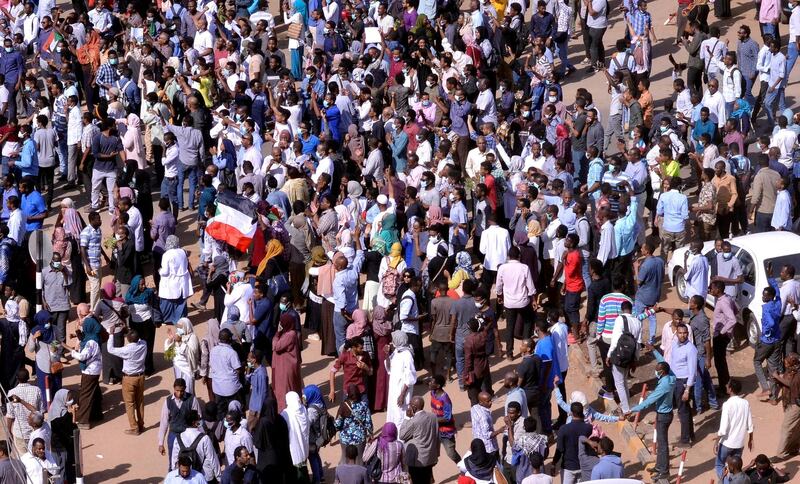Sudanese activists say they have waited decades for the nationwide protests that currently threaten the rule of President Omar Al Bashir and have no intention of stopping despite the violent response from security forces.
The catalyst for the unrest has been Sudan’s shattered economy, but activists say they also harbour longstanding grievances for crimes committed against them, their families and communities.
Amal El Zein is a human-rights lawyer who has defended political detainees since the 1980s, making her family a target of the government. Her brother has been arrested for his political activism three times since Mr Al Bashir seized power in 1989, while her other brother was dismissed from the police force just days after graduating from police college.
Ms El Zein's husband is also a human rights lawyer and critic of the regime, putting him on the government's radar. After protests broke out in the Nile state of Atbara on December 19, he suspected that security agents would come looking for him. He packed some belongings and went into hiding that same evening without telling his wife where he was going.
“We weren’t even in the protest, but security agents often summon well-known activists whenever there is unrest,” said Ms El Zein, 51. “Security agents knocked on our door the night after he escaped. They left after I told them that I don’t know where he is.”
Now alone with her son, Ms El Zein has joined protests in Khartoum despite the risk of reprisal. Rights groups say security forces have killed at least 37 people during protests so far and arrested hundreds, some of whom were later released. The protests have erupted in a half dozen cities across the country and appear to building momentum, with another planned in the capital on Friday.
“These demonstrations are a response to the accumulation of years of repression and economic theft by Bashir’s Islamist regime,” Ms El Zein said.
_______________
Read more:
[ US and other countries concerned by Sudanese protests crackdown ]
Editorial: No one should lose their life for the price of a loaf of bread
_______________
Mahmoud Lain, an activist from the western state of Darfur, which was subjected to a state-sponsored genocide beginning in 2003, has also joined the protests and says the state crackdown is amplifying the unrest.
On December 25, he attended a march towards the presidential palace in the centre of Khartoum. The demonstrators wanted to deliver a petition demanding that Mr Al Bashir step down as president.
The Sudanese Professional Association organised the march, which was backed by two of Sudan’s largest political parties, the Umma and Democratic Unionists. Yet the demonstration was quickly dispersed by tear gas and live ammunition. Security forces also reportedly beat protesters with batons.
"We just responded to the killing by throwing stones and chanting, 'Freedom, dignity and justice, the people want the downfall of the regime'," Mr Lain told The National.
A close friend was shot in the head and is still in hospital, he said.
The violence has not dissuaded protesters from mobilising. Asil, a women’s rights activist who did not disclose her last name, said the government was cutting internet services, making it difficult for protesters to organise and to contact journalists and rights groups.
Despite the challenges, she says her family has been waiting for such mass demonstrations since 1989. She also has a personal score to settle: three years ago, she was detained and beaten by security forces for speaking out against female genital mutilation, a custom still widely practiced in Sudan.
"The government has arrested so many of us, including children," Ms Asil told The National. "But all my family and relatives are still protesting, and we will remain together until the government of Bashir falls."
That is the only fate that Obama Mousa envisions for Sudan. As a boy, many of his friends and family were killed and raped by the Janjaweed, a state-sponsored militia that spearheaded the genocide in Darfur. And with essentials such as meat, fava beans and fuel now unaffordable for most Sudanese, Mr Mousa hopes the president will step down soon.
He suspects Mr Al Bashir will not relinquish power until he secures a safe exit. Without one, he could be handed over to the International Criminal Court, which issued a warrant for his arrest in 2009 for crimes committed in Darfur. One option could be Qatar, whose emir reportedly phoned Mr Al Bashir on December 22 to offer his support.
Mr Mousa says his people will continue to protest peacefully.
“Every revolution has a price and we are willing to pay the price,” he said. “We know Al Bashir’s militias are going to kill demonstrators, but we won’t back down.”





